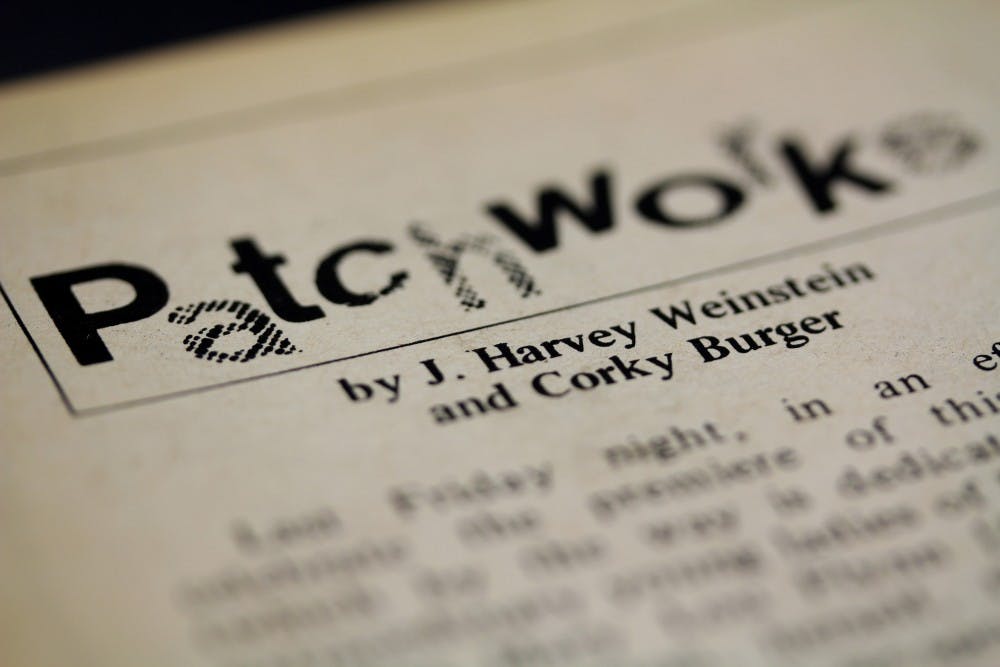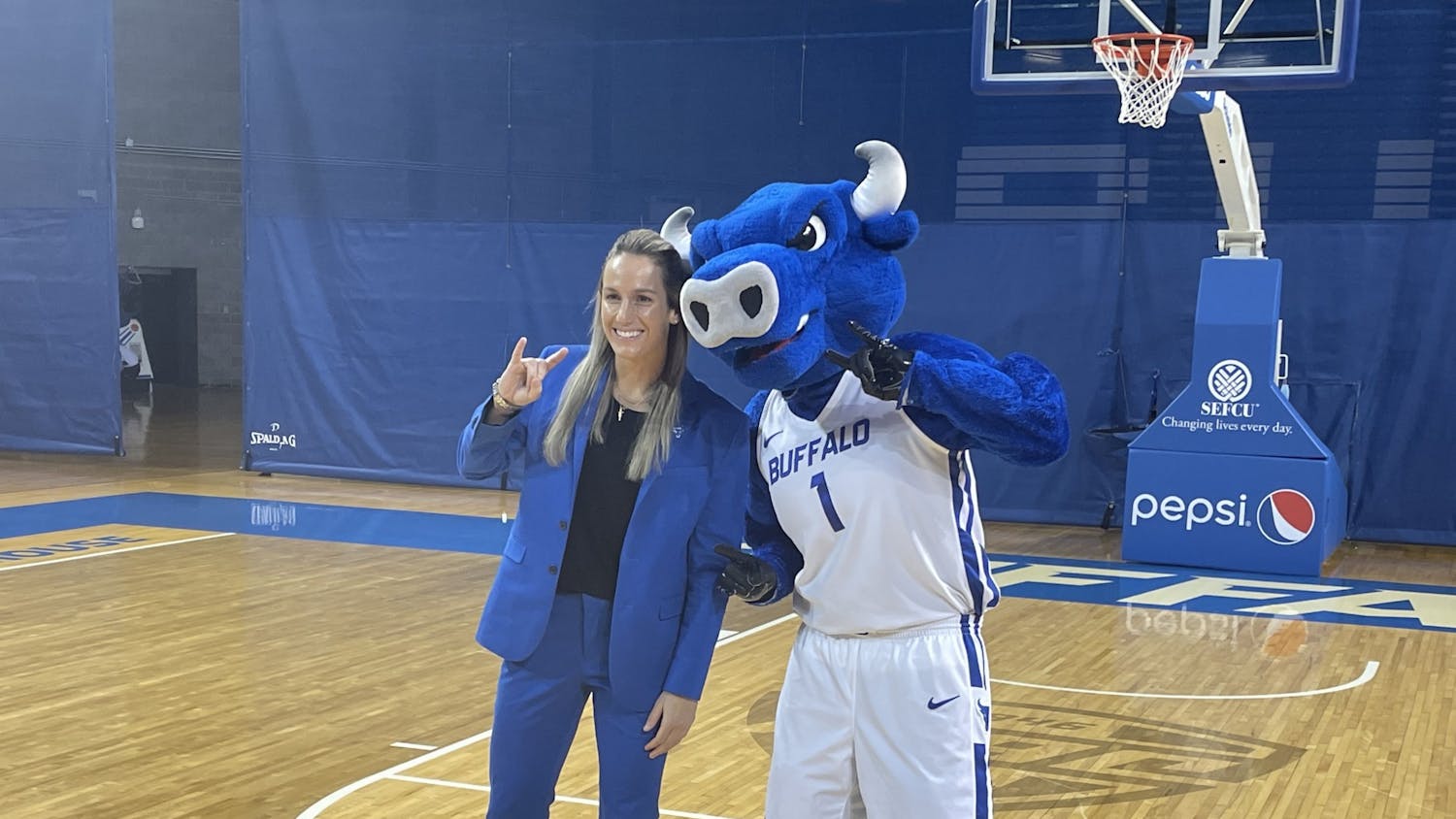Harvey Weinstein wrote about attacking women who refused his advances while he was a UB student and occasional Spectrum columnist in the 1970s.
In 1971, he penned a fictitious column in which a hustler named Denny tries to aggressively coerce women to spend time with him. “‘Denny the Hustler’ did not take no for an answer,” he wrote in one February piece. “His whole approach employs a psychology of command, or in layman’s terms — ‘Look, baby, I’m probably the best-looking and most exciting person you’ll ever want to meet — and if you refuse to dance with me, I’ll probably crack this bottle of Schmidt’s over your skull.’”
He was 18.
In recent weeks, more than 40 women have accused Weinstein, co-founder of Miramax film studio and producer of films like “Pulp Fiction” and “Shakespeare in Love,” of sexual misconduct, rape or assault. The accusations came after explosive articles in The New York Times and The New Yorker on Oct. 5 in which actresses and film industry workers accuse Weinstein of a pattern of abuse that spans decades. Actresses like Gwenyth Paltrow, Angelina Jolie and Cara Delevingne now say they were propositioned by Weinstein when they were young actresses and that he used his power in the film industry to force women to have sex or perform sex acts with him.
Weinstein reached at least eight settlements with women over the years, according to two company officials speaking on the condition of anonymity.
UB, which gave Weinstein an honorary doctorate degree in 2000, is in the process of revoking the diploma. Weinstein, an English major, attended UB from 1969 to 1973. Although he gave lavishly to other causes and some universities, Weinstein never made a personal donation to UB. In 2004 and 2005, Disney gave $23,000 to UB on behalf of Miramax for a media study scholarship.
During his years at UB, Weinstein served as contributing columnist for The Spectrum, where he occasionally wrote columnswith Horace “Corky” Burger under the title “Patchworks.”
His column—with its jokingly derogatory attitude toward women—did not elicit any letters to the editor or censure from the university. However, a letter to the editor also written in February, derides The Spectrum arts staff for not giving female bands enough attention in the paper.
Weinstein wrote a 1969 piece about a march for Vietnam War and a few 1970 pieces about film and arts events.
Students on campus have been buzzing about Weinstein, sexual assault and the role of women on campus.
Poorvi Thigale, a senior economics major and treasurer of UB Undergraduate Society of Feminists, said she feels Weinstein’s allegations are “disheartening but not surprising.”
“Sexual assault is prevalent everywhere; even on college campuses,” Thigale said. “The fact that so many women came out and spoke about [Weinstein] has definitely sparked a nationwide conversation about how widespread sexual assault and harassment is. It's also encouraged many victims to speak out.”
Thigale thinks more can be done to raise awareness of sexual assault.
“It's definitely a step in the right direction, but it’s not enough,” Thigale said. “We need to make more efforts to educate people on boundaries and consent from a young age.”
UB’s Wellness Education Services runs regular programs to educate students about sexual assault.
Qualeil Miller, a senior political science and economics major, works in the Wellness Education Services office and encourages students to learn about sexual assault and how to recognize the early signs of problems.
“In terms of rape prevention, people go around, think about it and may go around making jokes about it until the realization that it happens on a much higher level then you may have thought; so just physically knowing ways of prevention is a big deal and a big step toward prevention,” Miller said. “So people are here to believe you, support you and help you get whatever help you need in terms of recovery or prevention.”
David Morales, a sophomore English and psychology major, is a diversity advocate for the Intercultural and Diversity Center (IDC). Morales is heartened how many women are now speaking out.
“Often times, especially when there’s someone with a lot of power and it’s a man, [accusers] don’t speak out against this because of the amount of influence,” Morales said. “So it’s good to have voices heard and to show the women who might have not been strong enough to go against [Weinstein} that they’re helping make Hollywood safe. Hopefully, they’re making it a better place as Hollywood moves on and [there will be] more equality, especially in [terms] of gender.”
Jackie Singer, an Alcohol and Other Drug Harm Reduction Specialist with WES, said in terms of advocacy, the Office of Equity, Diversity and Inclusion (EDI) accommodates those who experience sexual violence. WES provides professionals on-staff who offer support for survivors of sexual violence, in addition to providing programs regarding rape and sexual assault prevention. There are also fully confidential resources available on campus, like Crisis Services, which can be reached at any time of day and on-campus via text or call.
“Anyone can experience sexual violence, so that position of an on-campus advocate is going to be immersed in the system and can accompany anyone who has experienced this to appointments,” Singer said. “We have many of the services which are offered for someone who experiences violence while they’re at UB. They’re also available for people who experienced it before coming to UB – childhood or other times in life.”
The arts desk can be reached at arts@ubspectrum.com .

Benjamin Blanchet is the senior engagement editor for The Spectrum. His words have been seen in The Buffalo News (Gusto) and The Sun newspapers of Western New York. Loves cryptoquip and double-doubles.
Brenton Blanchet is a junior communication major and The Spectrum's managing editor. His hobbies include collecting vinyl, jogging and meeting Mariah Carey.

The Spectrum elected Brenton Blanchet as editor-in-chief for the 2019-20 academic year. Blanchet has been writing for The Spectrum since 2016.





